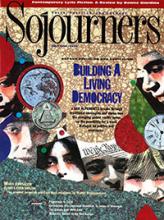What this country needs is a great political party--one I propose to name the Democratic Party, after what used to be a great political party. And what, you might ask, do we do with the organization that currently represents itself as a party with the same name? Like movie cowboys who, with great reluctance, end the suffering of a faithful horse, we could pull a gun, avert our eyes, and put it out of its misery. Or we could take it to court on the grounds that it has been illegally impersonating an opposition party.
This may sound harsh for someone who has been a lifelong Democrat, as was my father, an immigrant from Lebanon who served as mayor of Wood, South Dakota, for 16 years. My first vote when I turned 21 went to Adlai Stevenson, and I ran in five elections as a Democrat in Republican South Dakota. The only Republican I've ever voted for, at least for high office, was Gerald R. Ford--his was the only name Richard Nixon offered to the Senate for vice president after Spiro Agnew resigned.
But I've gone from being a partisan zealot to a voter who today believes the only way to distinguish between Senators Strom Thurmond (R-S.C.) and Chris Dodd (D-Conn.) is Thurmond's hair transplant.
With few exceptions--Howard Metzenbaum, Ted Kennedy, Nebraska's Bob Kerrey, George McGovern, Henry B. Gonzales, Texas Agriculture Commissioner Jim Hightower, and Mario Cuomo come to mind--the Democrats have lost their nerve, their ability to debate the issues, their desire to compete. Beyond that, they've lost touch with the old coalition of minorities and working people that made the Democrats the party that set the standard both for humanity and for knowing how to win elections.
Read the Full Article
